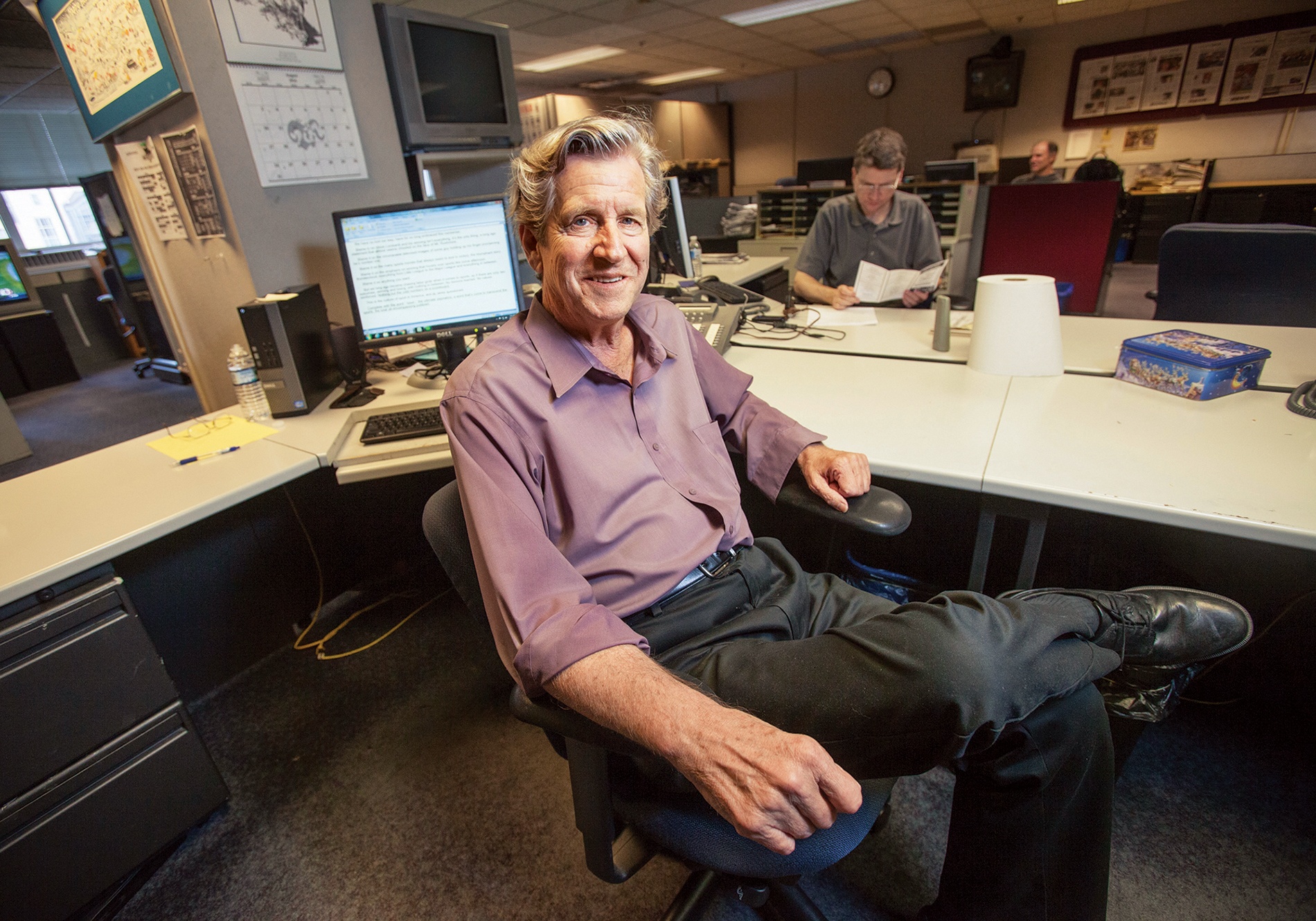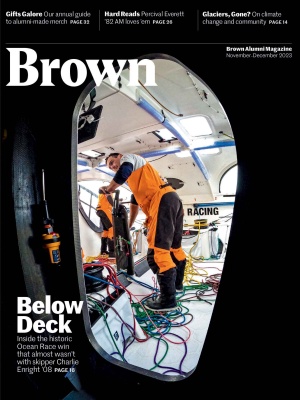Bill Reynolds ’68—Brown Basketball Hall of Famer, New York Times–bestselling author, and longtime Providence Journal sportswriter whose weekly column, For What it’s Worth, was a must-read for Rhode Islanders—died on July 13 after a battle with Alzheimer’s.
Reynolds was a beloved figure in the Rhode Island sports community and beyond. Six-foot-three and fair, sporting black chinos and a rumpled sports shirt, he was for 40 years a familiar figure in gyms and locker rooms across the state. At a late July event honoring his life and the publication of a collection of his articles, Story Days, family, teammates, opponents, friends, and readers gathered to celebrate a man everyone called “The Shooter.”
Basketball coach Mike Martin ’04 remembered him as a staunch supporter of the Bears and the man who had surely seen more Brown basketball games than anyone on the planet. High school teammates recalled his loyalty. His friend, backcourt partner, and 1968 co-captain, Rick Landau ’68, spoke of his singular humility. Reynolds was the high scorer and most talented player on the team, but would never speak a word about himself—or even listen to praise. And Landau noted his privacy. “Billy was mysterious. We didn’t know his phone number, where he lived, or what he did in his spare time.”
I was his teammate, roommate, and friend for almost sixty years and I didn’t have his phone number either. I reached him at the sports department at the Providence Journal like everybody else. But I know what he did. He spent his life watching and listening to the struggles and triumphs of everyday people. His 12 books and countless articles focused on some nationally known winners—coach Rick Pitino and star player Marvin Barnes—but his specialty was capturing the players who battled personal tragedy and injury, the unknown coaches who labored in noisy gyms, the stars after their glory days, facing addiction and legal difficulties. Then he rendered the beauty of their lives in prose that never drew attention to itself but jumped from the page when it should.
Bill’s stunning 1995 book Fall River Dreams follows a high school basketball hero in a dying town as he rides a wave of adulation toward personal disaster. It is as much ethnology as sports book, the writing as elegant as the shot that gave Reynolds his nickname.
Boston Globe sportswriter Bob Ryan wrote that the local writers all envied Billy because “unlike the rest of us, he could actually play.” He could.
I remember our freshman year, in a game against Leicester Junior College, Billy started raining jump shots. The rest of our team simply stood and watched as Billy dribbled a few steps past halfcourt, swept the ball over his head and launched. It wasn’t his speed or modest elevation that impressed. It was the release. Again and again, his fingertips caressed the ball into a reverse spin that carried it through a lofty arc and then into the softest drop. Swish.
He must have hit that shot 15 or 16 times for 38 points. There was no shot clock or three-point shot in those days. If there had been, he would have had 50 points or more. Later in his college career, Bill faced some of the best teams and defenders in the country and they couldn’t stop him either. It is hard to fathom now but in the years 1966 through ’68, when Bill played for Brown, the Ivy League featured some of the best teams in the country. Some had more than one NBA player on the roster. Columbia and Princeton were top 20 and Penn wasn’t far behind. Even Cornell beat Kentucky at Kentucky in 1966.
I remember one elite defender, Heyward Dotson from Columbia, trying to figure Billy out. With the ball, Reynolds turned his back on Dotson. He twitched to the left and right and spun left. The ball held high, the fingertips, the release. Swish.
It might warm the heart to say that Bill found a mentor on the faculty at Brown who guided him on the road from athlete to writer or caught his spark of inspiration from an assigned book or class discussion. But that is not what happened. He and I bonded because, like me, he felt like an outsider at Brown. Academically unprepared and intellectually unmotivated, we spent our time playing in the old Marvel gym or on local courts, or in our dorm room telling stories.
Bill Reynolds was a master storyteller. The room would fill with listeners to tales told and retold about his high school coach, a World War II veteran of D-Day who evoked the Normandy beach landing before every away game. “Off and on,” he’d howl as if the team bus were a landing craft and the opponent’s gym the beach. Or Reynolds’s collection of stories about Byrnes, a prep school classmate with a genius for mayhem. The tales were too preposterous to be true, but too vivid and detailed to be made up. Later on in life, Bill would tell stories about famous coaches he knew that were so outlandish and funny he could have taken them on the standup circuit.
But a lot of his best material never made it into his books or his column because Billy would never publish a story at someone else’s expense. He was the kindest of men. And when he fell ill that kindness came back to him. His life partner, Liz Abbot, stood like a Viking by his side all the way. His high-school teammate, Mike Raffa, visited him every week for years. At the book launch, Raffa stood at the microphone, weeping for his friend. At the wake, hundreds of Rhode Islanders waited in line for hours to pay their respect.
Bill covers his journey from basketball star to journalist, his years of doubt, his growing love of books, and his chance meeting with legendary columnist Jimmy Breslin in his absorbing 1999 memoir, Glory Days.
But there’s one story he does not tell in the book.
Some kind of banter led to a first-to-21 shooting contest after practice between Billy and our coach, Stan Ward. Stan stood to the side as Billy led off, shooting from 18 feet away at the back of the key. Shot after shot dropped through the hoop. At 15 in a row, the old coach started to trudge toward the exit. The shots were still falling as the door closed behind him.
The gym is empty now and dark. But we remember Bill Reynolds and we can still hear that sound. Swish.





